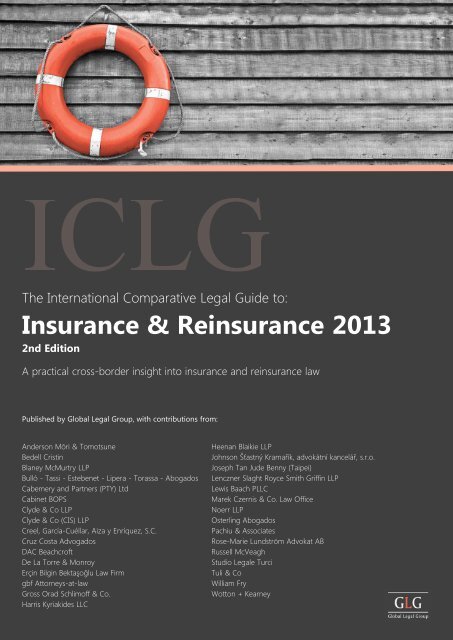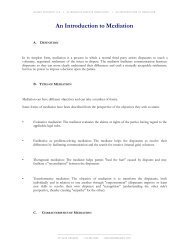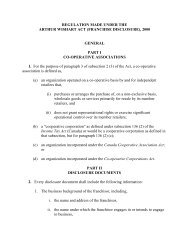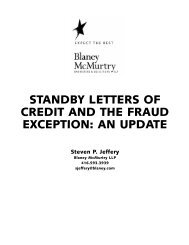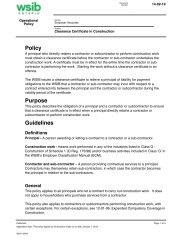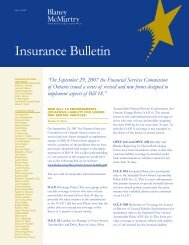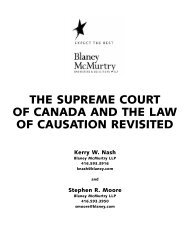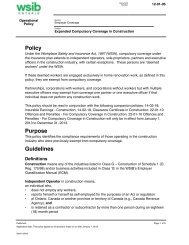A Canadian Roadmap - Blaney McMurtry LLP
A Canadian Roadmap - Blaney McMurtry LLP
A Canadian Roadmap - Blaney McMurtry LLP
Create successful ePaper yourself
Turn your PDF publications into a flip-book with our unique Google optimized e-Paper software.
The International Comparative Legal Guide to:<br />
Insurance & Reinsurance 2013<br />
2nd Edition<br />
A practical cross-border insight into insurance and reinsurance law<br />
Published by Global Legal Group, with contributions from:<br />
Anderson Mōri & Tomotsune<br />
Bedell Cristin<br />
<strong>Blaney</strong> <strong>McMurtry</strong> <strong>LLP</strong><br />
Bulló - Tassi - Estebenet - Lipera - Torassa - Abogados<br />
Cabemery and Partners (PTY) Ltd<br />
Cabinet BOPS<br />
Clyde & Co <strong>LLP</strong><br />
Clyde & Co (CIS) <strong>LLP</strong><br />
Creel, García-Cuéllar, Aiza y Enríquez, S.C.<br />
Cruz Costa Advogados<br />
DAC Beachcroft<br />
De La Torre & Monroy<br />
Erçin Bilgin Bektaşoğlu Law Firm<br />
gbf Attorneys-at-law<br />
Gross Orad Schlimoff & Co.<br />
Harris Kyriakides LLC<br />
Heenan Blaikie <strong>LLP</strong><br />
Johnson Šťastný Kramařík, advokátní kancelář, s.r.o.<br />
Joseph Tan Jude Benny (Taipei)<br />
Lenczner Slaght Royce Smith Griffin <strong>LLP</strong><br />
Lewis Baach PLLC<br />
Marek Czernis & Co. Law Office<br />
Noerr <strong>LLP</strong><br />
Osterling Abogados<br />
Pachiu & Associates<br />
Rose-Marie Lundström Advokat AB<br />
Russell McVeagh<br />
Studio Legale Turci<br />
Tuli & Co<br />
William Fry<br />
Wotton + Kearney
The International Comparative Legal Guide to: Insurance & Reinsurance 2013<br />
Contributing Editors<br />
Jon Turnbull & Geraldine<br />
Quirk, Clyde & Co <strong>LLP</strong><br />
Account Managers<br />
Brigitte Descacq, Henry<br />
Galezowski, Dror Levy,<br />
Maria Lopez, Florjan<br />
Osmani, Oliver Smith,<br />
Rory Smith, Toni Wyatt<br />
Sub Editors<br />
Beatriz Arroyo<br />
Fiona Canning<br />
Editor<br />
Suzie Kidd<br />
Senior Editor<br />
Penny Smale<br />
Group Consulting Editor<br />
Alan Falach<br />
Group Publisher<br />
Richard Firth<br />
Published by<br />
Global Legal Group Ltd.<br />
59 Tanner Street<br />
London SE1 3PL, UK<br />
Tel: +44 20 7367 0720<br />
Fax: +44 20 7407 5255<br />
Email: info@glgroup.co.uk<br />
URL: www.glgroup.co.uk<br />
GLG Cover Design<br />
F&F Studio Design<br />
GLG Cover Image Source<br />
iStockphoto<br />
Printed by<br />
Ashford Colour Press Ltd<br />
February 2013<br />
Copyright © 2013<br />
Global Legal Group Ltd.<br />
All rights reserved<br />
No photocopying<br />
ISBN 978-1-908070-50-0<br />
ISSN 2048-6871<br />
Strategic Partners<br />
General Chapters:<br />
1 Insurance Contract Law Reform Proposals in the United Kingdom – Jon Turnbull<br />
& Michelle Radom, Clyde & Co <strong>LLP</strong> 1<br />
2 “Institutional Bad Faith”: The Risks and How to Avoid Them – Mark J. Leimkuhler<br />
& Joseph L. Ruby, Lewis Baach PLLC 7<br />
3 Breach of the Notice Condition and Relief from Forfeiture: A <strong>Canadian</strong> <strong>Roadmap</strong><br />
– Mark G. Lichty & Lori D. Mountford, <strong>Blaney</strong> <strong>McMurtry</strong> <strong>LLP</strong> 12<br />
4 New Framework for Insurance and Surety in Mexico – Leonel Pereznieto del Prado, Creel,<br />
García-Cuéllar, Aiza y Enríquez, S.C. 19<br />
5 Hidden Treasure and Hydra’s Heads: How Clarifying <strong>Canadian</strong> Insurance Law can Address<br />
Environmental Harm – Glenn Smith & Ren Bucholz, Lenczner Slaght Royce Smith Griffin <strong>LLP</strong> 23<br />
Country Question and Answer Chapters:<br />
6 Argentina Bulló - Tassi - Estebenet - Lipera - Torassa - Abogados:<br />
Carlos A. Estebenet & Francisco Barbarán 32<br />
7 Australia Wotton + Kearney: David Kearney & Adam Chylek 37<br />
8 Brazil Cruz Costa Advogados: Dennys Zimmermann & Julio Costa 44<br />
9 Canada Heenan Blaikie <strong>LLP</strong>: Bernard Amyot & Vivian Bercovici 51<br />
10 Colombia De La Torre & Monroy: Camila de la Torre Blanche<br />
& Gabriela Monroy Torres 58<br />
11 Cyprus Harris Kyriakides LLC: Michalis Kyriakides & Alexis Theodotou 65<br />
12 Czech Republic Johnson Šťastný Kramařík, advokátní kancelář, s.r.o.: Eva Nováková<br />
& František Čech 71<br />
13 England & Wales Clyde & Co <strong>LLP</strong>: Jon Turnbull & Geraldine Quirk 77<br />
14 France Cabinet BOPS: Pascal Ormen & Alexis Valençon 85<br />
15 Germany Noerr <strong>LLP</strong>: Dr. Oliver Sieg & Dr. Henning Schaloske 90<br />
16 Guernsey Bedell Cristin: Mark Helyar 97<br />
17 India Tuli & Co: Neeraj Tuli & Celia Jenkins 102<br />
18 Ireland William Fry: John Larkin & Ruairi Rynn 108<br />
19 Israel Gross Orad Schlimoff & Co.: Harry Orad & Sigal Schlimoff-Rechtman 114<br />
20 Italy Studio Legale Turci: Pierangelo Celle & Marco Turci 120<br />
21 Japan Anderson Mōri & Tomotsune: Tomoki Debari & Tomoyuki Tanaka 126<br />
22 Mexico Creel, García-Cuéllar, Aiza y Enríquez, S.C.: Leonel Pereznieto del Prado<br />
& Luis Alberto Díaz Rivera 131<br />
23 New Zealand Russell McVeagh: Sarah Armstrong & Caroline Laband 135<br />
24 Peru Osterling Abogados: Enrique Ferrando & Marco Rivera Noya 141<br />
25 Poland Marek Czernis & Co. Law Office: Marek Czernis & Pawel Mickiewicz 146<br />
26 Romania Pachiu & Associates: Geani Carasol & Marius Nita 154<br />
27 Russia Clyde & Co (CIS) <strong>LLP</strong>: Máire Ní Aodha & Polina Kondratyuk 160<br />
28 South Africa Cabemery and Partners (PTY) Ltd.: Edmond Cibamba Diata<br />
& Fulgence Kalema 166<br />
29 Spain DAC Beachcroft: Ignacio Figuerol 171<br />
30 Sweden Rose-Marie Lundström Advokat AB: Rose-Marie Lundström<br />
& Gudrun König 177<br />
31 Switzerland gbf Attorneys-at-law: Lars Gerspacher & Dr. Laurent Chassot 183<br />
32 Taiwan Joseph Tan Jude Benny (Taipei): Daryl Lai & Jeff Lee 189<br />
33 Turkey Erçin Bilgin Bektaşoğlu Law Firm: Dilek Bektaşoğlu-Sanlı<br />
& Pelin Aydoğdu 195<br />
34 USA Lewis Baach PLLC: Martin R. Baach & Mark J. Leimkuhler 201<br />
Further copies of this book and others in the series can be ordered from the publisher. Please call +44 20 7367 0720<br />
Disclaimer<br />
This publication is for general information purposes only. It does not purport to provide comprehensive full legal or other advice.<br />
Global Legal Group Ltd. and the contributors accept no responsibility for losses that may arise from reliance upon information contained in this publication.<br />
This publication is intended to give an indication of legal issues upon which you may need advice. Full legal advice should be taken from a qualified<br />
professional when dealing with specific situations.<br />
www.ICLG.co.uk
Chapter 3<br />
Breach of the Notice<br />
Condition and Relief<br />
from Forfeiture: A<br />
<strong>Canadian</strong> <strong>Roadmap</strong><br />
<strong>Blaney</strong> <strong>McMurtry</strong> <strong>LLP</strong><br />
Mark G. Lichty<br />
Lori D. Mountford<br />
12<br />
Of all the conditions contained in a Commercial General Liability<br />
policy (“CGL” policy), coverage issues seem to most often arise<br />
from alleged breach of the notice requirements.<br />
Generally, the notice requirements are set out in a condition<br />
regarding “Duties in the Event of Occurrence, Offense, Claim or<br />
Action”. Typical wording includes: “the named insured must see to<br />
it that the insurer is notified as soon as practicable of an occurrence<br />
or an offense which may result in a claim”; and “if a claim is made<br />
or action is brought against any insured, the named insured must: …<br />
notify the insurer as soon as practicable”. Typically, there is an<br />
additional requirement that the insured “immediately” provide the<br />
insurer with copies of any demands, notices, summonses or legal<br />
papers received in connection with the claim or action. 1<br />
The rationale for inclusion of the notice condition in a CGL policy<br />
is relatively straightforward. The insured is to provide notice of an<br />
occurrence or offense promptly so that the insurer may commence<br />
an investigation and, possibly, mitigate damages. The purpose<br />
behind the requirement that the insured immediately forward on to<br />
the insurer demands, pleadings and the like is, similarly, to allow<br />
prompt investigation of the claim by the insurer and, where<br />
appropriate, to facilitate settlement. 2<br />
Notice from Whom<br />
One of the questions which arises upon reading the typical notice<br />
condition is whether receipt by the insurer of notice and legal<br />
papers from a source other than the named insured is sufficient. Is<br />
the rationale underlying the condition satisfied in such<br />
circumstances<br />
The recent decision of the Ontario Court of Appeal in Walker v<br />
Sovereign General Insurance Co provides some guidance to<br />
insureds, insurers and coverage counsel faced with this question. 3<br />
The court held the requirements under a CGL policy relating to<br />
notification of claims and delivery of legal proceedings to be met by<br />
the actions of another party in the underlying litigation.<br />
The litigation arose out of a slip and fall. The plaintiffs sued the<br />
property owner, as well as the insured who contracted to maintain<br />
the property. The property owner advanced a crossclaim against the<br />
insured. Although it appears the pleadings were served on the<br />
insured (who was bankrupt), there was no evidence that the insured<br />
provided notice of the claim to its liability insurer, Sovereign.<br />
Approximately two years after the Amended Statement of Claim<br />
and the Amended Statement of Defence and Crossclaim were<br />
served on the insured, counsel for the property owner advised<br />
Sovereign of the action and the scheduled trial date. 4 Counsel for<br />
the property owner also forwarded copies of the pleadings to the<br />
insurer. Sovereign, however, chose not to participate in the action<br />
despite adjournment of the trial. The plaintiffs settled with the<br />
property owner and obtained judgment against the insured. The<br />
plaintiffs sought to enforce the judgment against Sovereign directly.<br />
In its defence, Sovereign pled breach of the policy condition<br />
requiring: prompt written notice of an accident or occurrence be<br />
given “by or for the Insured to the Insurer”; and that “the Insured”<br />
immediately forward every writ, letter, document or advice<br />
received to the insurer in the event claim is made or suit is brought.<br />
The court rejected this defence. Provision of notice and the<br />
pleadings by the co-defendant in the underlying litigation was held<br />
to satisfy the policy condition.<br />
On a plain reading, the provision allowed for notice to be given by<br />
a person other than the insured. The purpose of the notice provision<br />
is to make the insurer aware of a claim against its insured in order<br />
that it may respond in a timely manner, i.e., assign an adjuster to<br />
investigate and counsel to defend.<br />
The court reasoned that, given this purpose, a person with sufficient<br />
proximity to have knowledge of the information required by the<br />
condition, including sufficient particulars to identify the insured,<br />
reasonably obtainable information with respect to the time, place<br />
and circumstances and the names and addresses of witnesses, could<br />
give notice on the insured’s behalf. The property owner was such a<br />
person. Notice by the co-defendant was effective notice to<br />
Sovereign and satisfied the policy condition. 5<br />
The typical notice condition quoted at the beginning of this paper is<br />
arguably distinguishable from that considered by the Court of<br />
Appeal in Walker. The typical notice condition refers to notice by<br />
“the named insured” as opposed to notice “by or for the Insured”.<br />
A submission could be made that, strictly interpreted, the quoted<br />
wording necessitates fulfillment of the condition by the named<br />
insured. On the other hand, the purpose underlying the condition is<br />
fulfilled regardless of the source of the notice.<br />
There are two Saskatchewan lower court decisions suggesting that<br />
notice from a source other than the insured satisfies this policy<br />
requirement.<br />
In Junet Estate v Saskatchewan Government Insurance, the insured<br />
solicitor did not give the insurer notice of a negligence claim<br />
against him until almost two months after having been served with<br />
the Statement of Claim. 6 The plaintiffs in the underlying action,<br />
however, had given notice of the claim to the insurer along with a<br />
copy of the pleading approximately two and a half weeks after<br />
service. The Saskatchewan Court of Queen’s Bench was satisfied<br />
that the insured had complied with the condition in the policy<br />
requiring written notice be given “by or on behalf of the Insured” to<br />
the insurer as soon as practicable upon becoming aware of a claim<br />
and that every demand, notice, summons or other process received<br />
be forwarded by the insured on to the insurer immediately.<br />
WWW.ICLG.CO.UK<br />
ICLG TO: INSURANCE & REINSURANCE 2013<br />
© Published and reproduced with kind permission by Global Legal Group Ltd, London
<strong>Blaney</strong> <strong>McMurtry</strong> <strong>LLP</strong><br />
Breach of Notice Condition & Relief from Forfeiture: Canada<br />
Maurice J. held, “[t]he defendant was aware of the claim against the<br />
solicitor and had a copy of the statement of claim 19 days after it<br />
was served on him”. Maurice J. concluded, “I am satisfied that the<br />
solicitor complied with this section; the notice received by the<br />
defendant was prompt and reasonable under the circumstances”. It<br />
follows that the court’s focus was on receipt of notice and pleadings<br />
by the insurer rather than the source of same.<br />
In Cedar Hut Restaurant Ltd v Wawanesa Mutual Insurance Co, the<br />
Saskatchewan Court of Queen’s Bench found the insured to have<br />
complied with the notice requirement of a statutory condition in a<br />
fire insurance subscription policy where, even before the insured<br />
could have provided written notice, the insurers’ adjuster was on the<br />
scene of the fire loss. 7 The notice requirement provided that the<br />
insured must give written notice forthwith to the insurer upon the<br />
occurrence of any loss of or damage to insured property. The fire<br />
occurred at or about 12:50 a.m. on 18 July 1983. The insureds were<br />
advised of the fire at or about 1:07 a.m. and 1:20 a.m. and<br />
subsequently attended at the fire. In the early hours of the morning,<br />
the police contacted the insurers’ agent to advise of the fire and, on<br />
18 July 1983, the insurers’ adjuster attended the premises to conduct<br />
an inspection. In the circumstances, the notice received by the<br />
insurers was found to be prompt and reasonable.<br />
Based upon the above cases, insurers and their coverage counsel<br />
should be aware of a potential argument that late or no notice from<br />
the insured ought to be excused where the insurer was in receipt of<br />
early notice from another source. Depending upon the precise<br />
wording of the notice condition, however, there may be arguments<br />
available to distinguish Walker, Junet Estate and Cedar Hut.<br />
What Constitutes Notice “As Soon As<br />
Practicable”<br />
In finding that the notice provided by the co-defendant complied<br />
with the notice condition under the CGL policy at issue in Walker,<br />
neither the Court of Appeal nor the Superior Court of Justice<br />
commented on the timeliness of such notice. It may be implied<br />
from their holdings that, despite the approximate two-year delay,<br />
notice of the suit was ‘prompt’ and forwarding of the pleadings after<br />
service within a similar amount of time was ‘immediate’. This<br />
result is somewhat surprising, especially given that the action had<br />
sufficiently progressed to be set down for trial prior to the insurer’s<br />
receipt of notice. It is, therefore, more likely that the insurer simply<br />
did not raise the argument.<br />
According to <strong>Canadian</strong> liability insurance scholar, Gordon Hilliker,<br />
the test applied by the court to determine whether there has been a<br />
breach of the notice requirements contains subjective and objective<br />
elements:<br />
The subjective element is that the insured must be actually aware<br />
of the circumstances which gave rise to the claim. The objective<br />
element is whether a reasonably prudent person, with knowledge<br />
of those circumstances, would consider that they would likely give<br />
rise to a claim. 8<br />
As noted above, typical CGL wording requires provision of notice<br />
by the insured to the insurer “as soon as practicable”. There are a<br />
number of <strong>Canadian</strong> decisions interpreting and applying the phrase<br />
“as soon as practicable”.<br />
In one case, notice given some ten months after an accident was<br />
held not to be “as soon as practicable” within the meaning of a<br />
liability insurance policy. 9 In another case, a proof of loss in respect<br />
of a fire was held not to have been provided “as soon as practicable”<br />
when it was delivered, incomplete, two years after the loss. 10<br />
Notice to an errors and omissions insurer of a claim within<br />
approximately one month of discovery of same, on the other hand,<br />
satisfied the requirement for notice “as soon as practicable”. 11 In<br />
yet another case, a delay of over six years was held to possibly<br />
constitute notice “as soon as practicable” in circumstances where<br />
the unnamed insured was unaware that his mother’s liability policy<br />
may afford coverage until he consulted a lawyer. 12<br />
The Alberta Queen’s Bench has observed that case law is of little<br />
assistance in establishing a general rule for what constitutes timely<br />
notice. In Hogan v Kolinsnyk, it was said that no precedents can be<br />
conclusive. 13 Instead, the court must have regard to all of the<br />
circumstances. It follows that the inquiry is fact-driven.<br />
Relief from Forfeiture<br />
Breach of the notice condition does not necessarily negate coverage<br />
under a CGL policy. In the event a court finds breach of the notice<br />
condition on a particular set of facts, the insured typically requests<br />
relief from forfeiture.<br />
Relief from forfeiture is an equitable remedy codified by statute in<br />
each common law province of Canada. The relief from forfeiture<br />
provision appearing in Ontario’s Insurance Act, for example, is as<br />
follows:<br />
Relief from forfeiture<br />
129. Where there has been imperfect compliance with a statutory<br />
condition as to the proof of loss to be given by the insured or other<br />
matter or thing required to be done or omitted by the insured with<br />
respect to the loss and a consequent forfeiture or avoidance of the<br />
insurance in whole or in part and the court considers it inequitable<br />
that the insurance should be forfeited or avoided on that ground,<br />
the court may relieve against the forfeiture or avoidance on such<br />
terms as it considers just.<br />
… 14<br />
A statutory provision regarding relief from forfeiture has been held<br />
to apply to breach of the notice provision in a liability policy. 15<br />
Section 109 of the Saskatchewan Insurance Act, in particular, has<br />
been interpreted by the Supreme Court of Canada to extend to<br />
breach of non-statutory terms in insurance policies. 16 In Falk Bros.<br />
Industries Ltd v Elance Steel Fabricating Co, it was held that<br />
section 109 empowered the court to grant relief from forfeiture for<br />
breach of the notice condition in an insurance contract. 17 In so<br />
finding, the Supreme Court of Canada identified the following<br />
purpose of the remedial section:<br />
The purpose of allowing relief from forfeiture in insurance cases is<br />
to prevent hardship to beneficiaries where there has been a failure<br />
to comply with a condition for receipt of insurance proceeds and<br />
where leniency in respect of strict compliance with the condition<br />
will not result in prejudice to the insurer. This purpose is<br />
consistent with interpreting s. 109 as permitting the court to grant<br />
relief from contractual as well as statutory conditions.<br />
In interpreting relief from forfeiture provisions, the courts have<br />
distinguished between imperfect compliance and non-compliance.<br />
Relief from forfeiture is available only with respect to the former.<br />
Failure to give notice during the policy period under a claims-made<br />
and reported policy, for example, is treated as non-compliance<br />
against which relief from forfeiture is not available. 18 Coverage<br />
under a claims-made and reported policy is triggered by the claim<br />
being made and reported during the policy period. It follows that<br />
failure to give notice during the policy period under such policy<br />
constitutes non-compliance with a condition precedent for<br />
coverage.<br />
Arguably, the Ontario Court of Appeal has carved out another<br />
policy condition the breach of which, in certain circumstances,<br />
amounts to non-compliance and precludes relief against forfeiture.<br />
ICLG TO: INSURANCE & REINSURANCE 2013 WWW.ICLG.CO.UK 13<br />
© Published and reproduced with kind permission by Global Legal Group Ltd, London
<strong>Blaney</strong> <strong>McMurtry</strong> <strong>LLP</strong><br />
Breach of Notice Condition & Relief from Forfeiture: Canada<br />
14<br />
In <strong>Canadian</strong> Newspapers Co v Kansa General Insurance Co, there<br />
was an arrangement between the insured and insurer whereby the<br />
insured newspaper publisher would conduct the defence of libel<br />
actions brought against it, but provide the liability insurer with<br />
material information regarding significant developments. 19 Contrary<br />
to the arrangement, the insured failed to report information<br />
concerning an offer to settle, the development of the claimant’s<br />
position regarding malice and lack of good faith and increased legal<br />
fees for an anticipated lengthy trial. These developments were held<br />
to all significantly affect the risk to the insurer.<br />
The insured was found to have substantially breached the duty of<br />
co-operation. The Court of Appeal referred to authority for the<br />
proposition that breach of the duty to co-operate, if substantial, is<br />
breach of a condition precedent to recovery. The Court of Appeal<br />
went on to conclude: “[t]his breach [by the insured newspaper<br />
publisher] is more than mere “imperfect compliance”, it is a<br />
substantial breach of the policy and on this basis alone [the insured]<br />
is not entitled to claim relief from forfeiture”. 20<br />
Failure to give notice of a claim within the time prescribed under an<br />
insurance contract has been accepted by the Supreme Court of<br />
Canada to constitute imperfect compliance for which the court has<br />
power to grant relief from forfeiture. 21 In Falk Bros., the Supreme<br />
Court of Canada explained:<br />
… The distinction between imperfect compliance and noncompliance<br />
is akin to the distinction between breach of a term of<br />
the contract and breach of a condition precedent. If the breach is<br />
of a condition, that is, it amounts to non-compliance, no relief<br />
under s. 109 is available.<br />
The case law has generally treated failure to give notice of claim<br />
in a timely fashion as imperfect compliance whereas failure to<br />
institute an action within the prescribed time period has been<br />
viewed as non-compliance, or breach of a condition precedent.<br />
Thus, courts have generally been willing to consider granting<br />
relief from forfeiture where notice of claim has been delayed:<br />
<strong>Canadian</strong> Equipment Sales & Service Co. v. Continental Insurance<br />
Co., supra; Minto Construction Ltd. v. Gerling Global General<br />
Insurance Co., supra; Moxness v. Saskatchewan Government<br />
Insurance Office, [1977] 3 W.W.R. 393 (Sask. D.C.); J[u]net<br />
Estate and Kallos v. Saskatchewan Government Insurance, supra;<br />
North Lethbridge Garage Ltd. v. Continental Casualty Co., [1930]<br />
1 W.W.R. 491 (Alta. S.C., App. Div.). See also: Dashchuk Lumber<br />
Ltd. v. Proman Projects Ltd., supra.<br />
On the other hand, cases in which failure to meet a time<br />
requirement has been held to be non-compliance rather than<br />
imperfect compliance have largely been cases in which the time<br />
period was for the commencement of an action rather than for the<br />
giving of notice: D.S. Ashe Trucking Ltd. v. Dominion Insurance<br />
Corp. (1966), 55 W.W.R. 321 (B.C.C.A.); National Juice Co. v.<br />
Dominion Insurance Co. (1977), 18 O.R. (2d) 10 (Ont. C.A.).<br />
An interesting question which arises is whether failure of an insured<br />
to provide any notice at all of a claim, as opposed to late notice,<br />
constitutes non-compliance such that the court has no power under<br />
the applicable statutory provision to grant relief from forfeiture.<br />
The lower court decision in Walker, although technically obiter,<br />
suggests that it does not. 22<br />
As previously discussed, the court in Walker found notice provided<br />
by a co-defendant to the insurer to be effective under the policy<br />
provisions. The court went on to consider the insured’s entitlement<br />
to relief from forfeiture in the event it was incorrect. Sovereign<br />
argued that there is no entitlement to relief from forfeiture under<br />
section 129 of the Insurance Act in the complete absence of<br />
compliance with the policy condition. In other words, Sovereign<br />
argued that relief from forfeiture is not available where the insured<br />
fails to provide any notice at all. The Superior Court of Justice<br />
disagreed. It quoted at length from Falk Bros., holding that such<br />
breach constitutes imperfect compliance only in respect of which<br />
relief from forfeiture is available. 23 The court reasoned that, at its<br />
worst, the insured failed to provide notice in a timely manner. This<br />
was contrasted with failure to bring an action within a stipulated<br />
time which is non-compliance in respect of which relief from<br />
forfeiture is not available.<br />
Sovereign argued, in the alternative, that there was substantial<br />
breach of a condition as in <strong>Canadian</strong> Newspapers entitling the<br />
insurer to deny coverage. The Superior Court of Justice rejected<br />
this argument as well. There was found to be no evidence of noncooperation<br />
by the insured. On the contrary, there was no<br />
documentation suggesting that Sovereign ever attempted to contact<br />
the insured’s principal even after receiving notice of the claim from<br />
the co-defendant. In circumstances where the insurer has notice of<br />
an action but decides not to take steps to defend it, the insurer<br />
cannot complain there was a lack of co-operation by the insured.<br />
The appellate court decision in Walker did not decide the issue. It<br />
held the case to be one of imperfect compliance as opposed to noncompliance<br />
on the facts. It reasoned that the case was not one<br />
where the insurer had no notice. The insurer had actual notice even<br />
if it was received from the crossclaiming co-defendant as opposed<br />
to from the insured. Again, the purpose of the notice condition was<br />
emphasised. The insurer had an opportunity to investigate,<br />
negotiate settlement and/or defend but chose not to do so.<br />
The question of whether no notice, as opposed to late notice,<br />
constitutes non-compliance, while interesting, is likely academic.<br />
Presumably, the insured could simply provide notice and forward<br />
on the pleadings at any time which would change the factual<br />
circumstances from one of no notice to one of late notice. The<br />
equitable remedy of relief from forfeiture would then be available.<br />
The Test for Relief from Forfeiture<br />
The test applied by the courts in determining whether to grant relief<br />
from forfeiture on a particular set of facts is well-established. There<br />
are two components. The first inquiry is whether the insurer has<br />
been prejudiced. The second relates to the conduct of the insured.<br />
The test has been outlined in a number of cases:<br />
I have reviewed dozens of cases and it has become clear that<br />
recourse to s. 103, and its counterpart in other jurisdictions with<br />
relation to other kinds of insurance, has always depended on the<br />
particular facts of the case, and on whether there was clearly some<br />
actual proven prejudice to the insurer, or potential prejudice which<br />
could not be quantified after the event. In addition, regard was had<br />
to the conduct of the insured, whether he had, for example,<br />
deliberately misled or lied to the insurer. There is no suggestion in<br />
this case that the plaintiff has been guilty of bad faith, or deliberate<br />
misrepresentation or concealment. 24<br />
Conduct is important in deciding whether to grant relief against<br />
forfeiture because insurance contracts are contracts of good faith<br />
and because the remedy is an equitable one. It is trite law that<br />
conduct amounting to a breach of good faith by an insured will<br />
disentitle the insured to relief against forfeiture...<br />
…<br />
Mackinnon J. A., speaking for the court in <strong>Canadian</strong> Equipment<br />
Sales & Service Co. v. Continental Insurance Co. (1975), 9 O.R.<br />
(2d) 7 at p. 16, 59 D.L.R. (3d) 333, stated:<br />
Section 103 is an ameliorating clause. It is not to be used to allow<br />
contracts entered into in good faith to be broken with a careless<br />
disregard for the rights of the insurer so as to cause actual or<br />
potential injury to the insurer’s position. 25<br />
... In the absence of bad faith, or a deliberate misrepresentation,<br />
relief should be granted where no prejudice has occurred … 26<br />
WWW.ICLG.CO.UK<br />
ICLG TO: INSURANCE & REINSURANCE 2013<br />
© Published and reproduced with kind permission by Global Legal Group Ltd, London
<strong>Blaney</strong> <strong>McMurtry</strong> <strong>LLP</strong><br />
Breach of Notice Condition & Relief from Forfeiture: Canada<br />
The trial Judge [who granted relief from forfeiture] found that<br />
there was no bad faith, concealment or deliberate<br />
misrepresentation on the part of the respondent. He also found, as<br />
a question of fact, that the appellant was in no respect prejudiced<br />
by the respondent’s failure to report promptly … 27<br />
As a general principle, the courts will exercise their discretion to<br />
relieve against forfeiture in favour of the insured where:<br />
(1) the claimant has not been guilty of fraud or wilful<br />
misconduct; and<br />
(2) the insurer has not been seriously prejudiced by the<br />
imperfect compliance with the statutory condition. 28<br />
Even in the absence of prejudice, relief from forfeiture should not<br />
be granted where there has been fraud or wilful misconduct on the<br />
part of the insured. It is therefore necessary to consider the reasons<br />
for the imperfect compliance with the terms of the contract. 29<br />
An analysis of the equities of a case and the availability of the<br />
remedy of relief against forfeiture necessarily involves a review of<br />
the conduct of the insured and a consideration of whether the<br />
insurer suffered any prejudice as a result of the breach. 30<br />
The relevant inquiry under the first component of the test for relief<br />
from forfeiture is whether there is actual prejudice to the insurer or<br />
potential prejudice which cannot be quantified after the event. The<br />
question under the second component of the test is, essentially,<br />
whether the insured has acted in bad faith, i.e., deliberately<br />
misrepresenting, deliberately misleading, committing fraud or other<br />
wilful misconduct.<br />
In Walker, both the Ontario Court of Appeal and the Ontario<br />
Superior Court of Justice held that to the extent to which the notice<br />
condition was breached, relief from forfeiture would be granted.<br />
The courts reasoned there was no evidence of conduct on the part<br />
of the insured (or the claimants and co-defendant for that matter)<br />
amounting to bad faith. As well, the claimants had established that<br />
the insurer suffered no prejudice as a consequence of any breach of<br />
the notice condition (including the co-defendant’s provision of<br />
notice of the claim over five years post-accident). In this regard,<br />
C.W. Hourigan J. wrote for the lower court:<br />
I am satisfied that Sovereign has suffered no prejudice. There is<br />
no specific prejudice alleged in its materials filed on this motion<br />
and I fail to see how any real prejudice could even be alleged. This<br />
was a slip and fall accident. Whether the insurer received notice<br />
six months or six years after the accident it is difficult to imagine<br />
that it would have acted any differently. This is not a situation<br />
where there was a loss of an opportunity to conduct an<br />
investigation. It should also be recalled that when Sovereign’s role<br />
as Sun Shelter’s insurer was discovered, counsel for the plaintiffs<br />
and [the property owner] adjourned the trial for almost an entire<br />
year. However, Sovereign chose to make no effort to contact the<br />
insured or participate in the action in any manner.<br />
A Possible Defence: Deliberate Late Report<br />
Of interest, there is a line of cases suggesting that where the failure<br />
of the insured to give timely notice to the insurer of a claim is<br />
deliberate, relief from forfeiture ought not to be granted even in the<br />
absence of prejudice. This line can be traced back to Supreme<br />
Court of Canada obiter in the Saskatchewan case, Union Marine &<br />
General Insurance Co v Bodnorchuk. 31<br />
The facts in Bodnorchuk are rather complicated. The matter arose<br />
out of a fire loss on 16 December 1954. The insurer, Union Marine<br />
& General Insurance, had issued a fire insurance policy on 3<br />
December 1953 for a three year term. The premiums were to be<br />
paid in three instalments. After the first premium instalment was<br />
paid, but prior to the second instalment coming due, the insured<br />
applied to the Saskatchewan Government Insurance Office and<br />
another policy was issued coming into force on 3 December 1954.<br />
There was an issue whether the Union policy continued in existence<br />
at the time of the fire.<br />
Union’s general agent learned of the fire on 16 December and called<br />
the insured the following day. The agent testified that the insured<br />
advised at that time that the Union policy had been cancelled prior<br />
to the fire. There was evidence that SGI’s adjuster told the insured<br />
on 5 February 1955 that the insured would have to contribute<br />
$5,000.00 to $6,000.00 because of a co-insurance clause contained<br />
in the SGI policy. The insured wrote to Union on 22 February 1955<br />
asking for settlement in respect to the fire loss under the Union<br />
policy. It was not until 17 March 1955, that the insured provided<br />
the insurer with proof of loss.<br />
The majority of the Court of Appeal found that the Union policy<br />
had not been cancelled by mutual agreement prior to the loss. 32<br />
The court granted relief from forfeiture for the insured’s failure to<br />
give notice in writing of the loss to the insurer forthwith as required<br />
by a statutory condition. This was on the basis that the insurer had<br />
suffered no prejudice since its agent had found out about the fire in<br />
any event and called the insured the day after.<br />
The majority of the Supreme Court of Canada allowed an appeal,<br />
finding that Union’s fire policy had been terminated before the loss.<br />
In the circumstances, the Supreme Court of Canada did not have to<br />
decide whether section 162 of the Saskatchewan Insurance Act,<br />
empowering the court to grant relief from forfeiture in<br />
circumstances of imperfect compliance, applied where an insured<br />
failed to give notice in writing to the insurer forthwith after the loss.<br />
Nonetheless, the Supreme Court of Canada went on to say that if<br />
relief from forfeiture was available under the Act, it was not<br />
appropriate to grant relief on the basis that the insured’s failure to<br />
give the required notice was deliberate.<br />
Citing the Supreme Court of Canada decision in Bodnorchuk, the<br />
Ontario Court of Justice (General Division) has stated that relief<br />
from forfeiture will not be granted, despite the absence of prejudice<br />
to the insurer, in circumstances where the insured deliberately fails<br />
to give timely notice of a claim or to co-operate with the insurer. 33<br />
In Terry v Law Society of Upper Canada, the insured solicitor did not<br />
give notice of an underlying claim to its insurer until 17 November<br />
1987 after being served with a Statement of Claim. The court,<br />
however, found that a person of ordinary prudence would have<br />
foreseen the claim as of receipt of 27 October 1986 correspondence, if<br />
not earlier, and certainly during the period from 12 November 1986 to<br />
2 February 1987. Once advised of the litigation, the errors and<br />
omissions insurer wrote to the insured advising that certain allegations<br />
made in the Statement of Claim raised coverage issues and requesting<br />
the insured’s co-operation with their investigator. The investigator’s<br />
attempts to interview the insured and to obtain file materials were<br />
unsuccessful. The Court of Appeal refused to grant relief from<br />
forfeiture on the basis that the insured’s failure to give notice within the<br />
proper time or to co-operate was deliberate.<br />
Accordingly, an argument may be formulated on the basis of<br />
Bodnorchuk and Terry that regardless of whether an insurer has<br />
been prejudiced by breach of the notice condition, relief from<br />
forfeiture ought not to be granted where it can be established that<br />
the failure to provide timely notice and/or to immediately pass on<br />
the pleadings was deliberate.<br />
It should be cautioned that insurers and their counsel may be met<br />
with the argument that Bodnorchuk and Terry are distinguishable<br />
where there is no bad faith or guilty motive on the insured’s part. In<br />
particular, it may be argued by the insured that Bodnorchuk and<br />
Terry are simply examples where the second component of the test<br />
for granting relief from forfeiture (relating to the insured’s conduct)<br />
ICLG TO: INSURANCE & REINSURANCE 2013 WWW.ICLG.CO.UK 15<br />
© Published and reproduced with kind permission by Global Legal Group Ltd, London
<strong>Blaney</strong> <strong>McMurtry</strong> <strong>LLP</strong><br />
Breach of Notice Condition & Relief from Forfeiture: Canada<br />
16<br />
was not met. In other words, on the facts of those cases, despite the<br />
absence of prejudice, there was a breach of the insured’s duty of<br />
good faith or some other intentional misconduct on the insured’s<br />
part. This distinction was accepted in Gulf Plastics Ltd v Cornhill<br />
Insurance Co. 34<br />
Final Thoughts<br />
The protection actually afforded to a CGL insurer by the notice<br />
condition against untimely reporting of an occurrence and late<br />
provision of pleadings in a claim is substantially fact dependant.<br />
There is no fixed time period against which to measure “as soon as<br />
practicable”. Further, a finding that the insured, in fact, breached the<br />
notice condition does not necessarily entitle the insurer to deny<br />
coverage. Relief from forfeiture may be granted in the absence of<br />
prejudice to the insurer, i.e., in its investigation, defence or resolution<br />
of the matter, where the insured has not acted in bad faith.<br />
There are, however, issues which have not been fully resolved by<br />
the <strong>Canadian</strong> courts. Is notice by a person other than the insured<br />
effective in all cases The trend is to find that the condition is<br />
satisfied. Is relief from forfeiture available for deliberate<br />
contravention of the notice condition even absent prejudice to the<br />
insurer Case law suggests relief may well not be available.<br />
However, for now, these issues remain open for policyholders and<br />
insurers to argue.<br />
Endnotes<br />
1. In the United States, the Insurance Services Office (the<br />
“ISO”) oversees standard form insurance contracts. In<br />
Canada, the Insurance Bureau of Canada (the “IBC”)<br />
provides approved wordings. The IBC was founded in 1964.<br />
It is a national industry association representing <strong>Canadian</strong><br />
home, car and business insurers. CGL forms are largely<br />
unregulated in Canada. Insurers may, therefore, modify,<br />
ignore or adopt the recommended policy form. Accordingly,<br />
attention must be paid to the particular policy wording used<br />
in any given CGL policy.<br />
Under the 1 October 2008 edition of the Commercial General<br />
Liability Policy IBC form 2100, the Commercial General<br />
Liability Conditions include:<br />
4. Duties In The Event of Occurrence, Offense, Claim or<br />
Action<br />
a. You must see to it that we are notified as soon as<br />
practicable of an “occurrence” or an offense which may<br />
result in a claim. To the extent possible, notice should<br />
include:<br />
(1) How, when and where the “occurrence” or offense<br />
took place;<br />
(2) The names and addresses of any injured persons and<br />
witnesses; and<br />
(3) The nature and location of any injury or damage<br />
arising out of the “occurrence” or offense.<br />
b. If a claim is made or “action” is brought against any<br />
insured, you must:<br />
(1) Immediately record the specifics of the claim or<br />
“action” and the date received; and<br />
(2) Notify us as soon as practicable.<br />
You must see to it that we receive written notice of the claim<br />
or “action” as soon as practicable.<br />
c. You and any other involved insured must:<br />
(1) Immediately send us copies of any demands, notices,<br />
summonses or legal papers received in connection with<br />
the claim or “action”;<br />
(2) Authorize us to obtain records and other information;<br />
(3) Cooperate with us in the investigation or settlement<br />
of the claim or defense against the “action”; and<br />
(4) Assist us, upon our request, in the enforcement of any<br />
right against any person or organization which may be<br />
liable to the insured because of injury or damage to<br />
which this insurance may also apply.<br />
d. No insured will, except at that insured’s own cost,<br />
voluntarily make a payment, assume any obligation, or incur<br />
any expense, other than for first aid, without our consent.<br />
Previously approved wording referenced ‘prompt’ notice as<br />
opposed to notice “as soon as practicable”.<br />
2. Gordon G. Hilliker, Liability Insurance Law in Canada, 5th<br />
ed (Markham: LexisNexis Canada, 2011) at 48, 51 [Hilliker].<br />
3. Walker v Sovereign General Insurance Co, 2011 ONCA 597,<br />
107 OR (3d) 225, [2011] OJ no 4106 (QL) [Walker].<br />
4. Walker v Sovereign General Insurance Co, 2010 ONSC<br />
3283, [2010] ILR I-5019, [2010] OJ no 2776 (QL) [Walker].<br />
5. Note that the Sovereign policy also contained a statutory<br />
condition regarding “Who May Give Notice And Proof”.<br />
This condition permitted notice of loss to be given and proof<br />
of loss to be made “if the insured refuses to do so, by a<br />
person to whom a part of the insurance money is payable”.<br />
The Court of Appeal held that the statutory condition did not<br />
apply to liability losses. It applied only to property losses<br />
such as fire and theft. The policy was interpreted as<br />
containing two standalone coverages: property; and liability.<br />
The statutory conditions applied to the former and the policy<br />
conditions applied to the latter.<br />
6. Junet Estate v Saskatchewan Government Insurance (1983),<br />
4 DLR (4th) 34, [1984] ILR 6709, [1983] SJ no 897 (QL)<br />
(Sask QB) [Junet Estate].<br />
7. Cedar Hut Restaurant Ltd v Wawanesa Mutual Insurance Co<br />
(1985), [1986] ILR 7657, [1985] 5 WWR 673, [1985] SJ no<br />
597 (Sask QB) (QL) [Cedar Hut].<br />
8. Hilliker, supra note 2 at 49.<br />
9. Glenburn Dairy Ltd v <strong>Canadian</strong> General Insurance Co<br />
[1953], 4 DLR 33, [1953] BCJ no 134 (QL) (CA).<br />
10. Permaform Plastics Ltd v London & Midland General<br />
Insurance Co, [1996] 7 WWR 457, [1996] MJ no 322 (QL)<br />
(CA).<br />
11. McKay v Cowan (1995), DLR (4th) 336, [1995] BCJ no 651<br />
(QL) (CA).<br />
12. Pribyl v Wilson-Murray (1993), 21 CCLI (2d) 205, [1993]<br />
BCJ no 2968 (QL) (CA). Note that the issue was not finally<br />
determined as the Court of Appeal simply found that the trial<br />
judge did not err in holding that the insurer’s application for<br />
dismissal was not suitable for summary determination in the<br />
circumstances.<br />
13. Hogan v Kolinsnyk (1983), 43 AR 17, [1983] AJ no 846 (QL)<br />
(QB) [Hogan].<br />
14. Insurance Act, RSO 1990, c 1.8, s 129. Relief from<br />
forfeiture sections in other jurisdictions include: Insurance<br />
Act, RSA 2000, c I-3, s 520; Insurance Act, RSBC 2012, c<br />
37, s 13; The Insurance Act, CCSM, c 140, s 130; Insurance<br />
Act, RSNB 1973, c I-12, s 110; Insurance Contracts Act,<br />
RSNL 1990, c I-12, s 10; Insurance Act, RSNS 1989, c 231,<br />
s 33; Insurance Act, RSPEI 1988, c I-4, s 92; Saskatchewan<br />
Insurance Act, RSS 1978, c S-26, s 109.<br />
15. Minto Construction Ltd v Gerling Global General Insurance<br />
Co (1978), 19 OR (2d) 617, 86 DLR (3d) 147, [1978] OJ no<br />
3355 (QL) (CA) [Minto].<br />
16. Albeit a predecessor to the section presently contained in the<br />
Act.<br />
17. Falk Bros. Industries Ltd v Elance Steel Fabricating Co,<br />
WWW.ICLG.CO.UK<br />
ICLG TO: INSURANCE & REINSURANCE 2013<br />
© Published and reproduced with kind permission by Global Legal Group Ltd, London
<strong>Blaney</strong> <strong>McMurtry</strong> <strong>LLP</strong><br />
Breach of Notice Condition & Relief from Forfeiture: Canada<br />
[1989] 2 SCR 778, 62 DLR (4th) 236, [1989] SCJ no 97<br />
(QL) [Falk Bros.].<br />
18. Stuart v Hutchins (1998), 40 OR (3d) 321, 164 DLR (4th) 67,<br />
[1998] OJ no 3672 (QL) (CA).<br />
19. <strong>Canadian</strong> Newspapers Co v Kansa General Insurance Co<br />
(1996), 30 OR (3d) 257, [1996] ILR I-3369, [1996] OJ no<br />
3054 (QL) (CA), leave to appeal to SCC refused, [1996]<br />
SCCA no 553 (QL) [<strong>Canadian</strong> Newspapers].<br />
20. Similarly, the Saskatchewan Court of Appeal has held that<br />
breach of the duty to co-operate by an insured on certain<br />
facts constitutes non-compliance with a policy condition in<br />
respect of which relief from forfeiture is not available. The<br />
particular condition at issue prohibited the insured from<br />
making voluntary payment, admitting liability or<br />
participating in any process to promote settlement of a claim.<br />
The court found the condition to be a fundamental term. The<br />
insurer’s right to investigate, deny or admit liability and<br />
settle are fundamental to an insurance policy and the<br />
insurer’s agreement to indemnify. The insured’s breach by<br />
admitting liability and agreeing to compensation for the loss,<br />
therefore, was a fundamental breach constituting noncompliance.<br />
See Colliers McClocklin Real Estate Corp v<br />
Lloyd’s Underwriters, Lloyd’s, England, 2004 SKCA 66,<br />
[2004] 11 WWR 393, [2004] SJ no 308 (QL).<br />
21. Falk Bros., supra note 17.<br />
22. Walker, supra note 4.<br />
23. In addition to the reasons in Falk Bros. quoted earlier in this<br />
paper, the Superior Court of Justice in Walker relied upon the<br />
following comments in Falk Bros.:<br />
The reasons for the distinction [between treatment of<br />
failure to give notice in a timely fashion as imperfect<br />
compliance and failure to commence an action within<br />
time as non-compliance] are bi-fold. First, failure to<br />
give notice of claim has been viewed as a breach of a<br />
term rather than a breach of a condition. Clearly,<br />
being akin to failure to meet a limitation period,<br />
failure to bring an action within the time required is a<br />
more serious breach than failure to give timely notice.<br />
A notice of a claim simply informs the insurer of the<br />
possibility of a future action, thereby allowing the<br />
insurer some time to investigate the merits of the<br />
claim and to negotiate a settlement: the actual bringing<br />
of an action, however, is the legal crystallization of the<br />
claim which sets its parameters and magnitude.<br />
Second, and probably more importantly, failure to<br />
give notice of the claim within the time required is a<br />
defect in provision of proof of loss for which relief<br />
against forfeiture is, by the terms of the statute,<br />
available. “Where there has been imperfect<br />
compliance with the statutory condition as to the proof<br />
of loss to be given by the insured or with any other<br />
matter or thing required to be done or omitted by the<br />
insured with respect to the loss and a consequent<br />
forfeiture or avoidance of the insurance in whole or in<br />
part”, s 109 gives the court power to relieve from such<br />
forfeiture or avoidance …<br />
I agree that failure to give notice of claim within a<br />
given period is a less serious breach than failure to<br />
bring an action within a stipulated time. I also agree<br />
that it relates to “proof of loss” or “any other matter or<br />
thing required to be done or omitted by the insured<br />
with respect to the loss”. I am therefore of the view<br />
that relief from forfeiture can be granted in respect of<br />
delayed notices of claims.<br />
24. <strong>Canadian</strong> Equipment Sales & Service Co Ltd v Continental<br />
Insurance Co (1975), 9 OR (2d) 7, 59 DLR (3d) 333, [1975]<br />
OJ no 2355 (QL) (CA).<br />
25. <strong>Canadian</strong> Newspapers, supra note 19.<br />
26. McNish and McNish v American Home Assurance Co<br />
(1989), 68 OR (2d) 365, [1989] OJ no 507 (H Ct J), aff’d<br />
(1991), 5 CCLI (2d) 222, [1991] OJ no 2256 (QL) (CA).<br />
27. Minto, supra note 15.<br />
28. Hogan, supra note 13.<br />
29. Qualiglass Holdings Inc v Zurich Indemnity Co of Canada,<br />
2004 ABQB 577, 368 AR 171, [2006] 3 WWR 505, [2004]<br />
AJ no 881 (QL).<br />
30. Walker, supra note 4.<br />
31. Union Marine & General Insurance Co v Bodnorchuk,<br />
[1958] SCR 399, 13 DLR (2d) 609, [1958] ILR 365, [1958]<br />
SCJ no 29 (QL) [Bodnorchuk].<br />
32. Bodnorchuk and Nowakowsky v Union Marine & General<br />
Insurance Co Ltd (1957), 9 DLR (2d) 179, [1957] SJ no 43<br />
(QL) (CA).<br />
33. Terry v Law Society of Upper Canada, [1992] OJ no 1678<br />
(QL) (Ct J (Gen Div)) [Terry].<br />
34. Gulf Plastics Ltd v Cornhill Insurance Co, (1990), 47 BCLR<br />
(2d) 379, [1990] ILR 10352, [1990] BCJ no 1541 (QL) (SC),<br />
aff’d (1991), 61 BCLR (2d) 64, 3 CCLI (2d) 203, [1991]<br />
BCJ no 3310 (QL) (CA). There, the British Columbia<br />
Supreme Court rejected an argument made by the insurer<br />
based on Bodnorchuk that there can be no relief from<br />
forfeiture where there is a deliberate failure to report the loss<br />
to the insurer. The court reasoned that the comments of the<br />
Supreme Court of Canada in Bodnorchuk were obiter.<br />
Further, the facts of the cases were distinguished. The<br />
deliberate failure to report in Bodnorchuk was characterised<br />
as having been done to take advantage of the insurer. The<br />
insured purported to cancel the policy having obtained a<br />
cheaper premium from a competitor. The insured<br />
subsequently tried to deny cancellation after discovering that<br />
the initial policy had better cover. The failure to provide<br />
notice in the case before the British Columbia Supreme<br />
Court, on the other hand, was innocent in that the insured<br />
thought there would be no call on the policy.<br />
ICLG TO: INSURANCE & REINSURANCE 2013 WWW.ICLG.CO.UK 17<br />
© Published and reproduced with kind permission by Global Legal Group Ltd, London
<strong>Blaney</strong> <strong>McMurtry</strong> <strong>LLP</strong><br />
Breach of Notice Condition & Relief from Forfeiture: Canada<br />
Mark G. Lichty<br />
Lori D. Mountford<br />
<strong>Blaney</strong> <strong>McMurtry</strong> <strong>LLP</strong><br />
2 Queen Street East, Suite 1500<br />
Toronto, Ontario M5C 3G5<br />
Canada<br />
Tel: +1 416 593 3961<br />
Fax: +1 416 593 5437<br />
Email: mlichty@blaney.com<br />
URL: www.blaney.com<br />
Mark’s practice is restricted to insurance and reinsurance<br />
matters, emphasising coverage issues arising from commercial<br />
property, commercial liability, directors and officers, homeowners<br />
and financial services policies. He also acts for cedants in<br />
reinsurance disputes. Mark acts as <strong>Canadian</strong> coverage counsel<br />
in respect of claims incident in the US, often involving class<br />
actions. He has given evidence in the US respecting <strong>Canadian</strong><br />
law. He acts as co-ordinating counsel in coverage matters arising<br />
in various <strong>Canadian</strong> provinces.<br />
In 2005, Mark was elected to the Federation of Defence and<br />
Corporate Counsel. He is profiled in Best Lawyers in Canada;<br />
Lexpert® <strong>Canadian</strong> Legal Directory; International Who’s Who:<br />
Insurance & Reinsurance; and Who’s Who Legal Canada; as one<br />
of Canada’s leading insurance counsel.<br />
Mark is a co-author of “Annotated Commercial General Liability<br />
Policy”, a leading <strong>Canadian</strong> insurance coverage text, quoted with<br />
approval by many Provincial appellate courts and the Supreme<br />
Court of Canada. He is widely sought as a lecturer and writer on<br />
insurance coverage topics.<br />
<strong>Blaney</strong> <strong>McMurtry</strong> <strong>LLP</strong><br />
2 Queen Street East, Suite 1500<br />
Toronto, Ontario M5C 3G5<br />
Canada<br />
Tel: +1 416 596 2889<br />
Fax: +1 416 593 5437<br />
Email: lmountford@blaney.com<br />
URL: www.blaney.com<br />
Lori Mountford is a senior associate at <strong>Blaney</strong> <strong>McMurtry</strong> <strong>LLP</strong> and<br />
a member of the firm’s Insurance Coverage Counsel and<br />
Insurance Litigation Groups.<br />
Lori obtained her LL.B. at the University of Toronto in 1998 and<br />
was admitted to the Ontario Bar in 2000. She also holds an<br />
Honours B.A. in philosophy.<br />
Lori’s focus at <strong>Blaney</strong> <strong>McMurtry</strong> is insurance coverage. Her<br />
practice encompasses opinion work, research, drafting,<br />
negotiation and litigation involving a range of policy coverages.<br />
These include commercial general liability, commercial property,<br />
homeowners insurance, builders risk, errors and omissions and<br />
directors and officers liability.<br />
Lori is an experienced litigator and has appeared before the<br />
Ontario Superior Court of Justice, the Financial Services<br />
Commission of Ontario and private arbitrators. She has also<br />
participated in numerous mediations in an advocacy role.<br />
<strong>Blaney</strong> <strong>McMurtry</strong> <strong>LLP</strong> is a multi-service firm, helping clients overcome challenges and seize opportunities for more than fifty years,<br />
with a comprehensive yet personalised, approach to advice and representation.<br />
In particular, the firm has a wealth of depth and experience in serving the insurance industry in both coverage and defence of a<br />
broad range of claims, and is recognised as one of the leading insurance law practices in Canada.<br />
<strong>Blaney</strong> <strong>McMurtry</strong> is a member of the Risk Management Counsel of Canada, a national association of law firms providing services<br />
to the risk management industry. The firm is also a member of TAGLaw, one of the world’s largest legal networks.<br />
18<br />
WWW.ICLG.CO.UK<br />
ICLG TO: INSURANCE & REINSURANCE 2013<br />
© Published and reproduced with kind permission by Global Legal Group Ltd, London
Other titles in the ICLG series include:<br />
Alternative Investment Funds<br />
Aviation Law<br />
Business Crime<br />
Cartels & Leniency<br />
Class & Group Actions<br />
Commodities and Trade Law<br />
Competition Litigation<br />
Corporate Governance<br />
Corporate Recovery & Insolvency<br />
Corporate Tax<br />
Dominance<br />
Employment & Labour Law<br />
Enforcement of Competition Law<br />
Environment & Climate Change Law<br />
International Arbitration<br />
Lending & Secured Finance<br />
Litigation & Dispute Resolution<br />
Merger Control<br />
Mergers & Acquisitions<br />
Mining<br />
Oil & Gas Regulation<br />
Patents<br />
PFI / PPP Projects<br />
Pharmaceutical Advertising<br />
Private Client<br />
Product Liability<br />
Project Finance<br />
Public Procurement<br />
Real Estate<br />
Securitisation<br />
Telecoms, Media & Internet<br />
Trade Marks<br />
59 Tanner Street, London SE1 3PL, United Kingdom<br />
Tel: +44 20 7367 0720 / Fax: +44 20 7407 5255<br />
Email: sales@glgroup.co.uk<br />
www.iclg.co.uk


